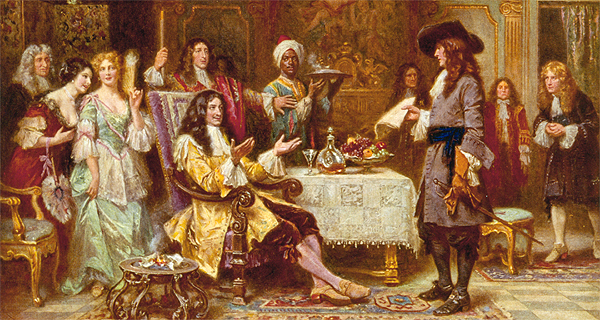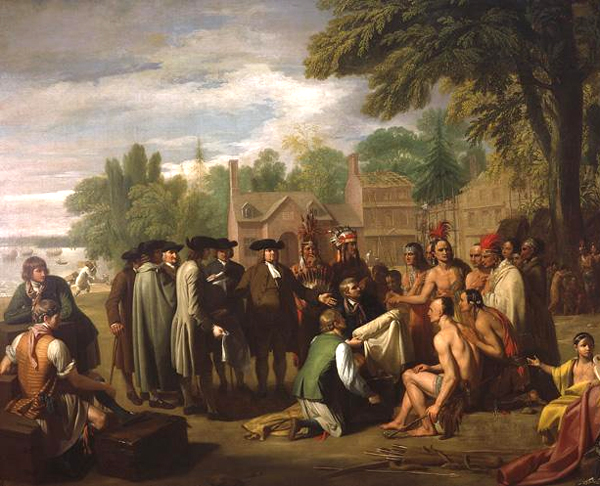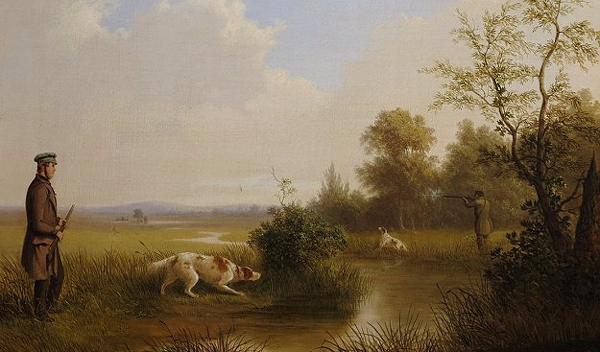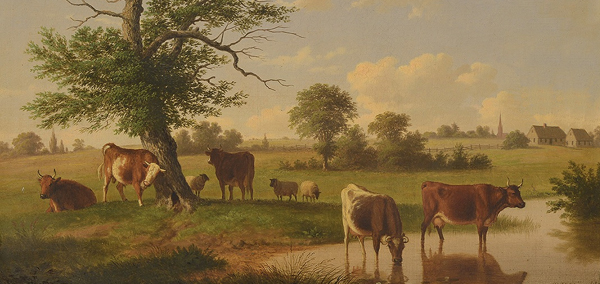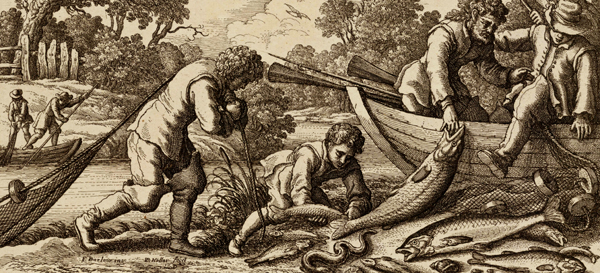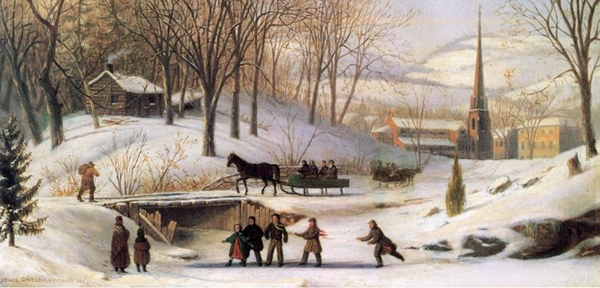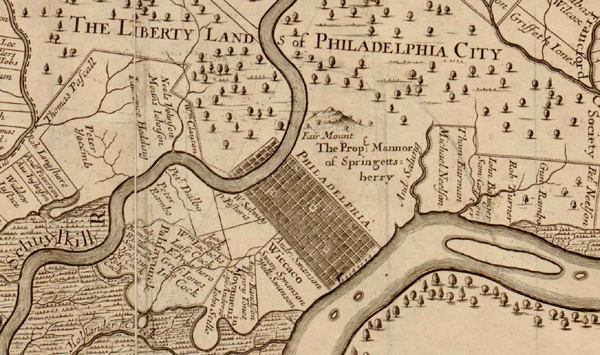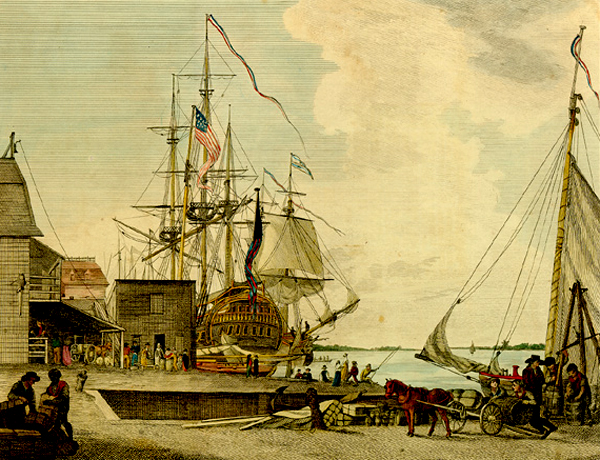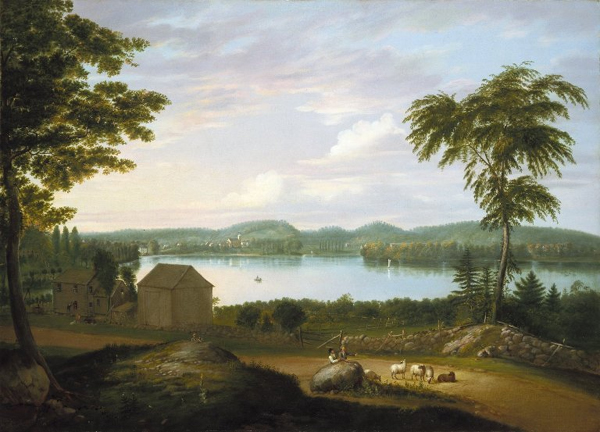Thomas Makin
1665 - 1733
|
|
Descriptio Pennsylvaniae
1729
Textus:Descriptio Pennsylvaniae, Anno 1729in: Robert Proud, The History of Pennsylvania,in North America, 1797, Vol. 2, p. 360Google BookDescriptio Pennsylvaniae, Anno 1729in: Early American Latin Verseed. L. M. Kaiser, Chicago 1984, p. 47Google Book
|
|
___________________________________________________
|
|
|
Extract from two short Latin poems, inscribed to James Logan, Esquire, by Thomas Makin; one of which is dated 1728, the other 1729; the former if entitled, “Encomium Pennsylvaniae” the latter, which is here principally retained, “In laudes Pensilvaniae poema, seu, descriptio Pensilvaniae” found among James Logan's papers, many years after his disease: they seem to have been written chiefly for amusement in his old age, etc. Note, Thomas Makin appears to have been one of the most early settlers in the province of Pensylvania from – for, in the year 1689, he was second master (George Keith being the first) of the Friends' public grammar school, in Philadelphia; which was the first of the kind in the province, and instituted about that time. He was sometimes clerk of the Provincial Assembly; which, in early rime, was long held in the Friends' meeting house. The English version is made by the transcriber, R. P.
―――――――
Descriptio PennsylvaniaeAnno 1729
Haec habet et regio memorabile nomen habebitauctior auctoris tempus in omne sui;qui fuit illustri proavorum stemmate natus,sed virtute magis nobilis ipse sua. | |
5 | Praecipue illustrem sua se sapientia fecit;vixit apud claros dignus honore viros.Qui quamvis obiit, tamen usque memoria vivet,nominis atque sui fama perennis erit.Semper honos nomenque suum laudesque manebunt |
10 | huius qui terrae nobilis auctor erat.Haec sua proprietas; hinc Pennsylvania primumhaec fuit ex domini nomine dicta sui,rege sibi Carolo concessa suisque Secundopro claris meritis officioque patris.
|
15 | Zonae terra subest alternae, ubi veris et aestus,autumni gelidae sunt hiemisque vices.Hic ter quinque dies numerat longissimus horas,cum sol in cancro sidere transit iter.Hic tamen interdum glacialis frigora brumae |
20 | et calor aestivus vix toleranda premunt.Saepe sed immodicum boreale refrigerat aestumflamen, et australis mitigat aura gelu.Hic adeo inconstans est et variabile caelum,una ut non raro est aestus hiemsque die. |
25 | Saepe prior quamvis nitido sit sole serena,postera fit multis imbribus atra dies.Vis adeo interdum venti violenta ruentis,ut multa in silvis sternitur arbor humi.
Hanc fera gens Indi terram tenuere coloni; |
30 | moribus at nunc est mitior usque bonis,pacis amans, Anglis concordi foedere iuncti,cura quibus pactam non violare fidem.Hi fugiunt rixas et noxia semina litis,et leges ultro iustitiamque colunt. |
35 | Hi spernunt artes durum fugiuntque laboremhos vacuos curis libera vita iuvat.
Hi venatores silvas et tesqua frequentantquaerentes ubi sit praeda reperta ferae,unde sibi pelles epulaeque parantur inemptae; |
40 | utile sunt pelles, merx pretiosa bonum.Devia rura diu longe lateque pererrant,et bene nota sibi semper ubique via est.
Durior interea exercet vigilantia nuptas,officium quibus est farra parare domi. |
45 | Hae baiulant fasces graves humerisque pusillis,et longum faciunt nunc patienter iter;nunc findunt lignum fissoque ex vimine corbestexunt: has urget sedulus usque labor.Nunc hae corna legunt et humi nascentia fraga, |
50 | nunc pisces capiunt insidiis et aves.Indorum iuvenes ullum gustare liquoremnon licet – exemplar nobile – praeter aquam.Mollibus in lectis Indi requiescere nolunt,nunc humus est lectus, nunc sibi nuda teges. |
55 | Pellibus antiquo qui more fuere ferinisinduti, nunc est gausape vestis iis.Semper et incedunt capitis velamine nudised sutae pelles pedesque tegunt,et quamvis cutis est fuscae color omnibus idem, |
60 | forma decora tamen corporis estque vigor.Hi lenocicium fugiunt et scorta pudici:foedera coniugii non violare solent.Hos docet ore loqui facilis natura diserto;linguae grande-loquens est idioma suae. |
65 | O gens Indorum, vos terque quaterque beati,nulla quibus requiem sollicitudo vetat!
Non regio haec Indos armis subigendo tenetur,sed certa emptori conditione data est;vivitur hic igitur tuto sine militis usu, |
70 | et sibi securus propria quisque tenet.Hic locus est multis felix, ubi sedibus aptissors optata dedit non sine pace frui.Dira sed infelix, heu, bella Nov' Anglia sensit,Indis quae semper gens malefida fuit.
|
75 | Sed semel hic rumor mendax clamavit «ad arma»,incola cui nimium credulus omnis erat.Haec malesana die fuit acta tragoedia quadam,cum convenerunt undique turba frequens,scilicet ut maior fieret commotus in urbe, |
80 | notior et multis rumor ubique foret.Usque adeo fuit hac confusus in urbe tumultus,ut neque tunc leges, ordo nec ullus erat;hic removere sua instanti properabat ab hoste,ille nihil contra iussit ab urbe vehi. |
85 | Sed quodcunque sibi voluit dementia talis,haec damno multis est memoranda dies.Vespere sed tandem fuit hoc stratagema retectum,fabula tunc istam finiit acta diem.
Fertilis hic frugum tellus optataque rerum |
90 | usibus humanis copia semper adest.Hic bene cultus ager laetis ornatur aristis,et solito messis tempore fervet opus.Quaevis silva feris et piscibus amnis abundat,fertque suum fructus quaelibet arbor onus. |
95 | Hic oviumque greges errant armenta boumque,errat et hic proles multiplicata suum.Hic saliunt damae, lepores celeresque sciuri,quae sunt immunis praeda cuique ferae;hic latet in silvis ursus, panthera lupusque, |
100 | qui pecus innocuum saepe vorare solent.Hic habitat latebras furto notissima vulpes,callida quae praedam nocte dieque capit;rarior at nunc haec proles inimica futura est,quae segetive nocent lanigerove gregi. |
105 | Lex fuit hic etenim tales bene cauta necandi,erret ut in silvis tutius omne pecus.Amphibia hic et non desunt animalia quaedam,terra quibus vitam praebet et unda parem;merx quorum pelles tantum venalis habetur, |
110 | utile non aliquod turpe cadaver habet.Hic avis est quaedam dulci celeberrima voce,quae variare sonos usque canendo solet.Hic avis est quaedam minima et pulcherrima plumis,sugere quae flores usque volando solet, |
115 | unde fugam muscae in morem properare videtur,tanquam non oculis aspicienda diu.Hic avis est quaedam rubro formosa colore,gutture quae plumis est maculata nigris.Hic avis est repetens, «whip, whip, will», voce iocosa, |
120 | quae tota verno tempore nocte canit.Hic et aves aliae, quotquot generantur ab ovis,scribere iam quarum nomina inane foret.Innumerae volitare solent hic saepe columbae,unde frequens multis obvia praeda datur.
|
125 | Hic aestate solet, tanquam aere gaudeat alto,tollere se ex summis saepe acipenser aquis,qui salit ac resilit toties – mirabile visu –in cumbas ingens praeda aliquando cadit;regius hic piscis minime pretiosus habetur, |
130 | rarior est at ubi, carior est et ibi.
Fossores varias hic invenere fodinas,unde metalla patent quae latuere diu.Floribus hic silvae variis ornantur et herbis,in quibus et virtus et medicina latet. |
135 | Hic muscae quaedam tanquam lampyrides alisaestiva nitidis undique nocte volant.Hic lapis est Magnes, quo non pretiosior ullus,per latum nautis qui mare monstrat iter.Hic lapidis linum pars assimilare videtur, |
140 | quae non exusta est nec fit in igne minor.Sed merx praecipue, regio quam praebet emendam,est venale quidem semper ubique bonum:scilicet omne bonum Cereris quod copia praebet,quodque onus hic multis navibus esse solet. |
145 | Huius fama loci multos alicunde vocavit,libertas quibus est dulcis amorque lucri.Huc alienigenae veniunt venientque quotannis,omnibus usque adeo libera terra placet.
Censibus hic nemo nimium vexatur iniquis, |
150 | unusquisque rei pro ratione licet.Hic venatori silvas licet ire per omnes,quamque capit praedam vendicat esse suam.Omnibus hic etiam capiendi copia pisces,retibus aut hamis quolibet amne datur; |
155 | qualis in Europa concessa licentia non est,commoda ubi curat quisque tenere sua.
Per maris huc primum venere pericla Britanni,deinde alii patriam deseruere suam.Adveniunt multi, Germana et Hibernica proles, |
160 | quos huc saepe nimis navis onusta vehit.Hanc terram sibi non acquisivere Britanni,si licet externis omnibus esse locum.Sed quanto fit agri maior cultura quotannis,hinc tanto rerum copia maior erit. |
165 | Arboribus scissis tellurem scindit arator;nascitur hinc sparso semine laeta seges.Dulcis aquae per rura fluunt hic undique fontes,unde pecus gaudet pingue levare sitim.Florida limosae fiunt hic prata paludes; |
170 | terra ferax est quae nuper eremus erat.
Legislatores, electi ad iura quotannis,conveniunt quoties constituenda libet.Publica nostra salus aequo moderamine legumservatur, leges dantque cuique suum. |
175 | Quisque suo meritas hic dat pro criminelex parcit nullis intemerata reis,atque magistratus iuste recteque gerendiquique potestatem iusque minister habet,sed licet imprimis ideo lex ipsa statuta est |
180 | puniat ut vitium iustitiamque colat,heu, quoties, virtus legis corrumpitur auro,pauperis et quovis iudice causa perit!Eloquar an sileam? si quando pecunia desit,lex perit et nihili iustus habetur inops. |
185 | Si tibi lis fuerit cum quovis aurea danteplurima – crede mihi – munera, victus eris! |
186a | Sed si forte cliens, opulentior aurea dones, |
186b | plura procul dubio munera victor eris.Aerea cum Danaen inclusam turris haberet,semper ut infelix innuba virgo foret,quam facile tegulas prorumperet aureus imber, |
190 | quid non vis auri vincit amorque Iovis!Non ergo mirum est hominum si vendere legesauri non aequus pectora cogat amor.
Cum fera saevit hiems glacie fluvialis et unda,atque latet tellus undique tecta nive, |
195 | circumclusa ratis, si non foret anchora, fixa estdum rigidum solvat mitior aura gelu.Et quamvis Boreas gelido bacchatur ab arcto,inturbata tamen fluminis unda silet.Ludere iam cessat summis acipenser ab undis, |
200 | atque alii pisces ima profunda petunt.Sed glacie rupta lino piscator et hamoex alto pisces gurgite saepe capit.Usque adeo interdum fuit hic durabile frigus,trans fluvium vidi plaustra onerata vehi.
|
205 | Hic tamen interdum totius tempore brumaenavibus haec amnis pervia praebet iter;cumbaque remigio velox veloque frequenteradvehit et revehit qua via ducit onus:usque adeo incerta est hic et variabilis aura, |
210 | alternasque vices frigus et aestus habent.
Pulchra duos inter sita stat Philadelphia rivos,inter quos duo sunt milia longa viae.Delawar hic maior, Sculkil minor ille vocatur,Indis et Suevis notus uterque diu. |
215 | Aedibus ornatur multis urbs limite longo,quae parva emicuit tempore magna brevi.Hic plateas mensor spatiis delineat aequis,et domui recto est ordine iuncta domus.Quinque sacrae hac aedes una numerantur in urbe, |
220 | altera non etiam distat ab urbe procul,ex quibus una alias est quae supereminet omnes,cuius nondum ingens perficiatur opus.Praecinit hic sacros divina melodia psalmos,et vox totius succinit inde chori. |
225 | Elevet hoc hominum mentes et mulceat aures,sed cor devotum psallit in aure Dei.Basis huic posita est excelsae firma futuraeturris, ubi dicunt aera sonora fore.Hic in gymnasiis linguaeque docentur et artes |
230 | ingenuae; multis doctor et ipse fui.Una schola hic alias etiam supereminet omnesRomano et Graeco quae docet ore loqui.Hic spatiosa domus tantae bene convenit urbi,in qua quotidie venditur omne penus, |
235 | huius et e summis maiori voce quotanniselectus praetor regulus urbis adest.
Hic portus multis statio est bene nota carinis,curvo ubi dente tenax anchora mordet humum.Hic mercaturae faciunt plerique periclum; |
240 | quisque sibi lucrum quaerit ubique suum.Artifices adsunt etiam quos exigit usus,qui sese exercent qualibet arte sua.Multa per hos pendent omnes insignia vicos,quod venale domum monstrat habere merum. |
245 | Nunc sub nave canunt hilares encomia vininautae, nunc tutos anchora fixa tenet;nunc sub sole sitim gaudent restinguere siccam,nectareum rorem siccus ut ipse bibit.Nunc et fonte libet puros haurire liquores |
250 | qui pretio nullo nocte dieque fluunt.Vinea cum patina laetis florente corymbisindicat hospitium semper adesse bonum.Scribere sed nimis est insignia nomina cuncta;quae iam descripsi sint meminisse satis.
|
255 | Providus in morem formicae alimenta reponitrusticus hiberni frigoris usque memor,aestivo reputans quodcumque labore lucratur,quae mox insequitur, longa vorabit hiems.Stramine tecta replet Cerealibus horrea donis |
260 | impiger, et curat condere quicquid habet;despicit exoticasque dapes vestesque superbas,contentus modicis vivere pace suis.Esuriens dulces epulas depromit inemptas,et proprio vestis vellere texta placet. |
265 | Parva humilisque domus, latos quae prospicit agros,parta vel empta, sibi sufficit atque suis.Utilis est illi, si non opulenta supellex;res sapiens omnes utilitate probat.
Thomas Makin. 1729.
―――――――
A Description or Pennsylvania, anno 1729.
First, Pennsylvania's memorable name, From Penn, the Founder of the country, came; Sprung from a worthy and illustrious race, But more ennobled by his virtuous ways. |
5 | High in esteem among the great he stood; His wisdom made him lovely, great and good. Tho' he be said to die, he will survive; Thro' future time his memory shall live: This wise Proprietor, in love and praise,
|
10 | Shall grow and flourish to the end of days. With just propriety, to future fame, Fair Pennsylvania shall record his name. This, Charles the Second did, at first command, And for his father's merits gave the land: |
15 | But his high virtue did its value raise To future glory, and to lasting praise. Beneath the temp'rate zone the country lies, And heat and cold with grateful change supplies. To fifteen hours extends the longest day, |
20 | When sol in cancer points his fervid ray: Yet here the winter season is severe; And summer's heat is difficult to bear. But western winds oft cool the scorching ray, And southern breezes warm the winter's day. |
25 | Yet oft, tho' warm and fair the day begun, Cold storms arise before the letting sun: Nay, oft so quick the change, so great its pow'r, As summer's heat, and winter, in an hour! So violent the wind, that oft the ground |
30 | With rooted trees is cover'd wide and round. A savage Indian race here first was known; But milder now, in life and manners, grown. To friendship's laws they faithfully adhere; And love the English with a mind sincere. |
35 | Of jars and baneful strife they shun the cause; And practise justice uncompell'd by laws. A life of case, and void of care, they chuse; But labour, and the toilsome arts, refuse. Thro' woods and forests wide, they hunting stray, |
40 | In search of beasts, their much beloved prey. Their skins, for cloaths, their flesh, for food is sought; Warm raiment, and delicious food, unbought. Thro' devious wilds, and woody deserts, they Oft wander far, but never lose their way.
|
45 | But more laborious in domestic care, The female sex their corn and bread prepare; Long journeys these, in patience, persevere; And heavy loads upon their bodies bear. With unremitted labor, too, the fame |
50 | Their wooden vessels make, and baskets frame. Wild fruits and strawberries by them are sought; And fish and fowl by various methods caught. All stronger drink than water from the lake, The Indian youth forbidden are to take. |
55 | No feather bed, nor easy couch they keep; Upon the ground, or shaggy skin they sleep. For cloathing, first warm skins they did possess; But now coarse linen hides their nakedness. Where'er they go their heads are always bare; |
60 | But skins upon their feet and legs they wear. Tho' brown, or copper colour, marks them all, Yet are their bodies proper, strait and tall. Chaste in their lives, unlawful lufts they fly; Scarce ever known to break the marriage tie. |
65 | With native eloquence their speech abounds, Untaught, with figures grand, and lofty sounds. O happy Indians! bless'd with joy and peace; No future cares of life disturb your ease!
On just and equal terms the land was gain'd, |
70 | No force of arms has any right obtain'd: 'Tis here without the use of arms, alone, The bless'd inhabitant enjoys his own; Here, many, to their wish, in peace enjoy Their happy lots, and nothing doth annoy. |
75 | But sad New England's diff'rent conduct show'd What dire effects from injur'd Indians flow'd!
Yet once to arms false rumor called here; To which the vulgar most inclined were. 'Twas on a certain day the plot began; |
80 | Deluded crowds together madly ran: By artful means the stratagem was laid, And great commotion thro' the city made; So wild the tumult and so great the fear, No law nor order was observed there: |
85 | While from th' approaching foe to hade away, One urg'd, another orders gave, to stay. This strange affair, whatever was design'd, For loss to many, will be kept in mind. The ev'ning did the plot's design betray; |
90 | The farce was ended with the closing day.
This fruitful land all plenty doth produce; And never fails to answer human use. Here yellow Ceres loads the joyful fields; And golden crops the happy harvest yields. |
95 | With beasts the woods, with fish the streams abound; The bending trees with plenteous fruits are crown'd. Here flocks and herds in flow'ry pastures stray; Their num'rous young around them feed and play. The squirrels, rabbits, and the timid deer |
100 | To beasts of prey are yet exposed here: The bear, the panther, and the wolf devour Th' innocuous flocks, which seldom are secure. Here dwells the crafty fox, which, night and day, Invents his wiles, to catch th' unwary prey. |
105 | But now these noxious beasts, which much annoy The growing grain, and tender flocks destroy, Are by a law diminish'd, with their breed, And in the woods more safe the cattle feed. Amphibious animals here too are found; |
110 | Which both in water live, and on the ground; These for their skins alone are ever priz'd, And lose their lives; their carcase is despis'd. 'Tis here the mocking bird extends his throat, And imitates the birds of ev'ry note; |
115 | 'Tis here the smallest of the feather'd train, The humming bird, frequents the flow'ry plain. Its motion quick seems to elude the eye; It now a bird appears, and now a fly. The various woodpeckers here charm the sight; |
120 | Of mingled red, of beauteous black and white. Here's whip-per-will; a bird, whose fanci'd name From its nocturnal note imagin'd, came. Here, in the fall, large flocks of pigeons fly, So num'rous, that they darken all the sky. |
125 | Here other birds of ev'ry kind appear, Whose names would be too long to mention here.
Large sturgeons num'rous crowd the Delaware; Which, in warm weather, leap into the air; So high, that (strange to tell!) they often fly |
130 | Into the boats, which on the river ply! That royal fish is little valu'd here; But where more scarce, 'tis more esteem'd and dear.
Here num'rous mines of many kinds are found, And precious metals, treasured in the ground. |
135 | The verdant woods, roots, herbs, and flow'rs produce, For many virtues fam'd for human use. Here insects are, which many much admire, Whose plumes in summer ev'nings shine like fire. Here too the magnet's found, whose wond'rous pow'r |
140 | Directs the seamen to each distant shore. Here is the stone-like flax 1) of wond'rous fame, For not consuming in the burning flame!
But the chief produce of this happy land Is always good, and ever in demand: |
145 | And bounteous Ceres' rich redundant stores Are shipp'd abroad to many distant shores. Its fame to distant regions far has spread, And some for peace, and some for profit, led; Born in remotest climes, to settle here, |
150 | They leave their nativc soil, and all that's dear; And still will flock from far, here to be free; Such pow'rful charms has lovely liberty!
Here high unequal taxes have no place; A just proportion ev'ry person pays. |
155 | Th' extensive woods abound with various game, Where all may freely take, and use the same. In ev'ry flowing stream, all persons may Take plenteous fish, and freely use the prey. Such privilege in Europe is unknown; |
160 | Where ev'ry man is bounded with his own. 'Twas hither first the British cross'd the main; Thence many others left their native plain: Hibernia's sons forsake their native home; And from Germania crowded vessels come. |
165 | Not for themselves alone the British care; Since ev'ry stranger may partake a share. Hence still more culture shall the soil receive; And ev'ry year increasing plenty give. Clear'd from the woods, more fruitful lands they gain; |
170 | And yellow Ceres loads the extended plain. Here bubbling fountains flow thro' ev'ry mead; Where flocks and herds delight to drink and feed. The marshy grounds improv'd rich meadows yield; The wilderness is made a fruitful fields.
|
175 | The Legislators, chosen ev'ry year, Proceed to act, as shall to them appear. Here just administration of the laws Make public good, and private right one cause. All crimes are punish'd, as their natures are; |
180 | The laws unwrested no offenders spare. All civil magistrates have pow'r and trust, To act, in office, what is right and just.
Tho' first it was th' intention of the laws To punish vice, and favour virtue's cause; |
185 | Yet, by the pow'r of gold how oft is lost The poor man's cause, and sacred justice crost! Nay, may it not be said, for cursed gold, Both law and justice oft are to be sold! If with the rich, to law a poor man go, |
190 | Believe me, he shall have an overthrow! For Danae fair had still remain'd a maid, And in the brazen tow'r securely staid, Had not the pow'r of gold unbarr'd the chain; What cannot gold and pow'rful love 2) obtain! |
195 | What wonder then, if love of gold compel The minds of men the right of law to sell?
When stormy winter whitens all below, When woods and plains are clad in ice and snow, The ships with icy chains are anchor'd fast, |
200 | Till the dissolving spring return at last; Tho' boreas rage, and stormy tempests blow, The streams are silent, and not seen to flow; The fish then near the surface cease to play, And to the bottom safely make their way. |
205 | But yet thro' holes, which in the ice are made, With hook and line goes on the fisher's trade. Sometimes the ice so strong and firm we know, That loaded waggons on the rivers go! But yet so temp'rate are some winters here, |
210 | That in the streams no bars of ice appear; And all the season boats and shipping may, With oar and sail divide the liquid way; So various and uncertain is the clime, For heat and cold extreme, in little time!
|
215 | Fair Philadelphia next is rising seen, Between two rivers plac'd, two miles between; The Delaware and Sculkil, new to fame, Both ancient streams, yet of a modern name. The city, form'd upon a beauteous plan, |
220 | Has many houses built, tho' late began; Rectangular the streets, direct and fair; And rectilinear all the ranges are. Five houses here for sacred use are known, Another stands not far without the town. |
225 | Of these appears one in a grander style; But yet unfinish'd is the lofty pile. Here psalms divine melodious accents raise, And choral symphony sweet songs of praise; To raise the mind, and sooth the pious ear; |
230 | But God devoted minds doth always hear. A lofty tow'r is founded on this ground, For future bells to make a distant sound. Here schools, for learning, and for arts, are seen, In which to many I've a teacher been: |
235 | But one, in teaching, doth the rest excel, To know and speak the Greek and Latin well. Here too, one spacious building we behold, Where all provisions brought are daily sold; From whose high steps too, loudly is proclaim'd |
240 | The annual Magistrate, the Mayor nam'd.
Here, in safe harbour, num'reus vessels moor, At anchor some, and some along the shore. In commerce many cross the stormy main, To distant countries, in pursuit of gain. |
245 | All necessary trades here get employ, And useful arts, which large rewards enjoy. Here signs, thro' all the streets, are hung in view. Where entertainment may be had, to shew. The merry sailors, while they land their wares, |
250 | The praise of Bacchus sing, and ease their eares; Yet often from the spring the draught is sought, Which here to all doth freely flow unbought But where fair ivy crowns the flowing bowl, There dwells the large, the hospitable soul. |
255 | More things, at present, I forbear to name Because too long – these are enough for fame. (Except the country swains' diftinguish'd praise Demand the notice of my closing lays).
The farmer, provident, amidst his cares, |
260 | For winter, like the prudent ant, prepares; Foreknowing, all that summer doth produce, Is only for consuming winter's use. He fills his barns and cellars with good cheer, Against that dreary season of the year. |
265 | He scorns exotic foods, and gaudy dress, Content to live on homely fare, in peace; Sweet to his taste his unbought dainties are; And his own home-spun he delights to wear. His lowly dwelling views his large domain, |
270 | Improv'd in part, where peace and plenty reign. Plain furniture, but useful, he doth chuse; And wisely values ev'ry thing for use. In these blest shades may I delight to be; Here little is enough, with peace, for me.
Thomas Makin. 1729.
―――――――― 1) Asbestus. 2) or Jove |

